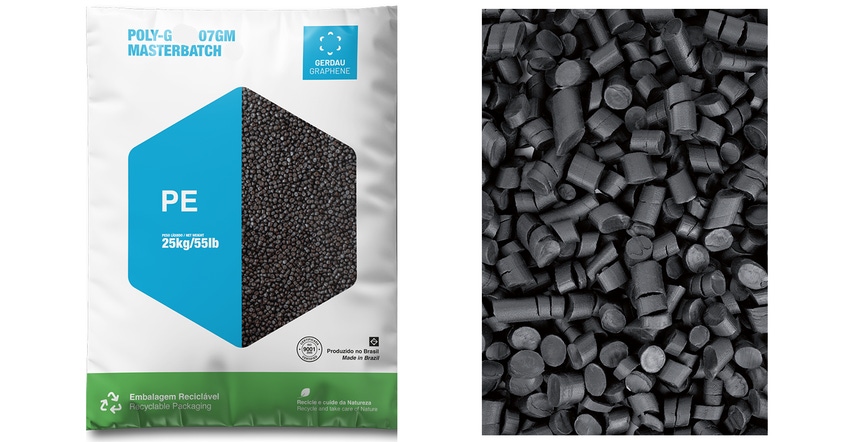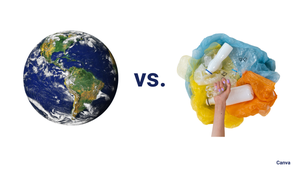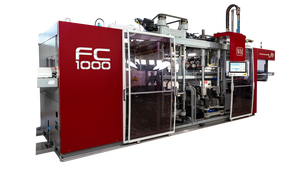Graphene-enhanced polyethylene masterbatch offers higher strength using thinner films to reduce costs, increase sustainability, and boost flexible packaging properties.

Gerdau Graphene, Sao Paulo, Brazil, launched graphene-enhanced Poly-G PE-07GM polyethylene (PE) masterbatch globally, making its first sales of the additive and forming a distribution agreement with Sumitomo.
The PE masterbatch — made with graphene, an extremely strong nanomaterial comprised of densely compacted carbon — can be used to produce films, profiles, and extruded sheets that are stronger and offer better performance than conventional PE products.
The benefits of Gerdau’s additive include reduced manufacturing cost and significantly less waste throughout the plastic lifecycle. Flexible packaging made using the specialty material can be recycled as PE through store drop-off programs.
Pilots of the PE masterbatch for various industrial applications, conducted in Gerdau factories prior to the additive’s commercialization, included flexible packaging for construction nails.
Graphene-boosted polyethylene passes stringent nail packaging test.
Results from that pilot showed that using 25% thinner graphene-enhanced PE film for the nail packaging resulted in notably fewer product punctures, reducing pre-consumer packaging waste by 39% and boosting productivity by 7%.
Gerdau’s masterbatch enhances the mechanical and thermal properties of PE, improves its processability, and enables thinner plastics.
The resulting material is stiffer and has more tensile strength than conventional PE, as well as improved gas barrier and UV resistance. The graphene-enhanced material also has a lower coefficient of friction, better thermal stability, and higher thermal and electric conductivity.
“Poly-G is a masterbatch suitable for all applications, not only for flexible packaging but also for rigid packaging and other markets such as automotive, textile, footwear, electronics, and so on,” Alexandre Corrêa, CEO of Gerdau Graphene, tells PlasticsToday.
“The only downside with the incorporation of graphene in plastics is a potential color change,” he acknowledges. “Graphene is dark gray in color and depending on the amount used can minimally impact the product's final color, though the polymer is still translucent. There is no negative impact in processability, and despite the current cost of graphene, the application and cost benefits result in a positive net value.”
Graphene-aided PE sustainability benefits also reduce manufacturing waste, energy use, and transportation costs.
Gerdau’s masterbatches offer sustainability benefits in addition to performance, processing, and cost advantages. The graphene additive enables plastic producers to manufacture stronger, more durable PE products using much less virgin resin and with lower production costs. The reduction in virgin resin translates into less post-consumer PE waste. Downstream benefits include reduced manufacturing waste, energy use, and transportation.
Of special note: Graphene-enhanced PE can be recycled.
“Poly-G PE-07GM is 100% recyclable with other polyethylene, and products containing Poly-G can be discarded as any other in drop-off programs. At end of life, products with Poly-G PE-07GM can be mechanically recycled and can be reintroduced to produce new products,” Corrêa says.
Few other companies offer graphene masterbatches, but the ability of Gerdau’s additive to disperse graphene throughout the polymer bulk sets it apart. “Our product is a plug-and-play solution, meaning that adjustments in the processing are unnecessary, and that the results we've seen in the lab as well as real-world applications indicate that Poly-G guarantees good dispersion of graphene and performance,” Corrêa explains.
Graphene/polyethylene masterbatch masterbatch available in Japan and the US/North America.
To support the commercialization of its graphene additive, Gerdau has partnered with Sumitomo to import and distribute Poly-G PE-07GM masterbatches in Japan.
"We are excited to partner with Gerdau Graphene to bring their high-quality graphene-enhanced masterbatches to the Japanese market,” says Naoyuki Tokunaga, general manager of Sumitomo’s Carbon Department.
“In the past years, there has been a strong drive for sustainability in Japan, and we believe graphene additives will be a key material to support our local customers in bringing better products to the local market,” Tokunaga adds.
Separately, Gerdau’s PE masterbatch is commercially available in North America, including the US.
As previously reported in PlasticsToday, Gerdau’s development work includes graphene additives for post-industrial and post-consumer recycled plastics and polymers, including polypropylene (PP), PE, polystyrene (PS), polycarbonate (PC), and polyvinyl chloride (PVC).
About the Author(s)
You May Also Like






